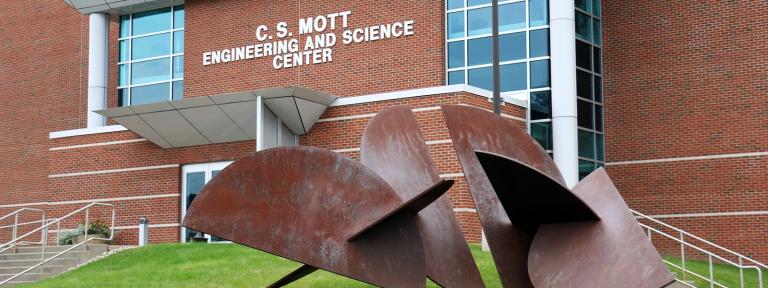
Two Kettering University students have been chosen as part of a 15-member group representing the United States at the first International Institute for Women in Engineering at the EPF Ecole d'Ingeneurs' (EPF) in the Paris suburb of Sceaux, July 1 through 13.
Maria Falcon (left) and Heather Lindell
Heather Lindell, senior from Lake Orion, and Maria Falcon, sophomore from Royal Oak, were chosen to participate in the two-week seminar "Engineering Cultures," co-sponsored by the EPF and Embry-Riddle Aeronautical University (ERAU). The focus of the institute is to study the cultural, political and economic dimensions of global engineering practices, and the opportunities for women engineers in the global marketplace.
Interested in the possibilities of working and studying abroad, Lindell and Falcon are excited to have been chosen to participate in the event. "I see it as the chance of a lifetime," said Lindell, "I'm not just going to a foreign country to wander around aimlessly, I like that it is very structured and we'll be taking a lot in."
"The fact that it has a global focus, and my co-op employer has facilities in Germany and Japan really piqued my interest," said Falcon. "Just to see how different cultures do things will be interesting."
Falcon's co-op employer is Takata in Auburn Hills. The company is based in Japan.
Joining Lindell and Falcon in Paris will be Associate Dean for Student Affairs and Associate Professor of Mechanical Engineering at Kettering Dr. Laura Sullivan, who will serve as a panelist for a dialog on balancing work and personal life.
A total of 30 students have been invited to attend, 15 from the U.S., and 15 non-U.S. ERAU was able to secure a National Science Foundation grant to fund the U.S. portion of this first year's program. The grant will pay the seminar fee, travel and lodging costs for U.S. participants.
The goal of the "Engineering Cultures" seminar is to improve students' abilities to understand and assess engineering problem solving in historical and global perspectives.
The seminar will emphasize topics relevant to the immediate and future experiences of the Institute's participants. It will include discussion and analysis of engineering practices and traditions, using the U.S., France, Germany, and the UK as examples. Focus will also be on what it means to be a woman in engineering in different national contexts.
Guest lecture topics and panel discussions will address opportunities for women in science and technology, women and leadership in a global workplace, and challenges and rewards on being a woman in science and technology in a global workplace. Participants will also have an opportunity to visit four companies, including a Japanese company located in Paris, to study their business practices.
Seminar topics include:
- From Cold War to Competitiveness: A Shift of Dominant Images of the World
- Women Engineers and Engineers Who Happen to Be Women: An Exercise
- Corporate Culture in the U.S. and Europe
- Japanese Perspectives: Be Sure You Suffer Enough
- British Perspectives: What Counts is Craftsmanship
- Panel discussion: Cultural Conflicts Encountered on the Job
- French Perspectives: What Counts is Theory
- Globalization : Opportunities for Women
- German Perspectives : What Counts is Quality
- U.S. Perspectives : The Tension between Theory and Practical Knowledge
In addition to the cultural dialog during sessions, participants are encouraged to continue to explore unfamiliar cultures in their free time. "They suggested we eat in a variety of cultural restaurants and spend time with other participants not from our own country," said Lindell.
An integral part of the Women's Institute seminar is the group project. The subject is chosen upon arrival and students are given time throughout the seminar to work on it. Depending on the topic, students undertake research during the site visits, carry out interviews with the seminar leaders and panelists. At the end of the program, the project is presented to the rest of the group. The project represents 20 percent of their grade for the course.
A certificate will be given during an official ceremony at the end of the program. U.S. students will earn three credits in SS399 Women in Global Engineering.
Lindell and Falcon are already calculating the opportunities available to them in the ever-growing global marketplace.
"This (the seminar) could really direct where my career goes," said Lindell. "My co-op employer, General Motors, has a lot of opportunities to work overseas," she said.
Falcon, with two to three years left before graduation, is committed to participating in the Kettering study abroad program. She even has her sights set on the Takata facility in Germany as a possible co-op rotation.
For both Lindell and Falcon the future may be global in scope, but for now, their immediate goal is to pick up as much French as they can by listening to language tapes in the car.